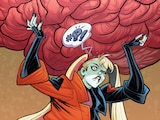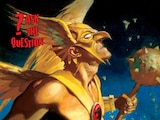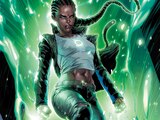Kahndaq—a nation ruled by a superhero tyrant. One controlled by might and fear of a man from ancient times empowered by gods. A nation which, indeed, worships their master like a god himself—and since his rise to power, has enjoyed peace and prosperity. Under the rule of Black Adam, Kahndaq is all the fears of Lex Luthor and all the hopes of Thaal Sinestro exemplified in a single nation in the Sinai Peninsula. And it’s Kahndaq which provides the setting for DC’s newest movie, Black Adam.
Thematically, the nation of Kahndaq presents the heroes of the DC Universe with a moral quandary: can a benevolent dictator be supported over the corrupt, self-serving regime they replace? Can the mighty be allowed to govern by force if their intentions are just? If you ask the people of Kahndaq, you might not get the answer you’d expect. Let’s review a few things we know about this fascinating corner of the DCU.
If you just remember one thing, make it this: it’s spelled “Kahn” like “Shao Kahn,” not “Khan” like “Wrath of Khan.”

Prior to the account of Black Adam’s history first told in 2002’s JSA #43, it was believed that the original homeland of Shazam’s first champion was in ancient Egypt. Indeed, Black Adam’s power source, which draws from the Egyptian gods of Shu, Heru, Amon, Zehuti, Aton and Mehen, suggests an inalienable cultural link between Adam and Egyptian lore. But as Kahndaq is located relatively close to Egypt, it’s understandable that there would be cultural similarities between the two nearby kingdoms, each of which celebrated their golden ages at similar points in time.
Citizens of modern day Kahndaq speak Arabic, are highly monarchic in their devotion to Black Adam and have a liberal policy on metahuman rights. Its capital city, Shiruta, has its own airport and is known for its opulent royal palace. Its flag, three intersecting triangles, perhaps depicts its nearby mountain range. Although its exact location in the Sinai Peninsula is unclear to us, it typically is seen sharing a border with its sometime rival nation of Bialya.

The very first account we know of Kahndaq is the nation’s most devastating fall, in JSA #43-44. According to Black Adam, Kahndaq was once a paradise free of disease, famine and violence. But in 1600 BCE, the mad alchemist priest Ahk-Ton used the elemental Orb of Ra to become the Metamorpho of the ancient world, gain control by force of the Egyptian empire and expand its borders in a bid to conquer the world. In Ahk-Ton’s drive for conquest, the nation of Kahndaq was razed to the ground. At the time, Kahndaq’s ancient champion Black Adam was away from his home, performing duties for the wizard Shazam. He returned to find his wife and children murdered. Ahk-Ton would die by Adam’s hand, the first step on a slope towards tyranny which would leave the wizard with no choice but to banish Adam from the Earth.
In 2003’s Hawkman #19, we learn a little of what went on in recent years. Like nearby Egypt, Kahndaq was looted by Napoleon’s army in the late 18th century, the British Empire soon after and has been subjected to a string of dictators ever since. In the early 2000s, it was a man by the name of Asim Munuhhad who had a reputation for child labor camps and torturing political prisoners.
What was different is that for the first time in 3,600 years, Black Adam was free to reclaim his people. In “JSA: Black Reign,” with the help of a contingent of American heroes sympathetic to his cause, Black Adam would depose Munuhhad and claim Kahndaq for himself. Under Black Adam, justice would be harsh and swift, but without exception for anyone who would sully the nation’s peace.

That peace, justly earned or not, would not last. In “Day of Vengeance,” the entity of Eclipso corrupted the powerful Spectre to direct his might at the world at large. Despite the intervention of the Justice Society of America, Kahndaq was one of the nations hit the hardest by the Spectre’s attacks. It’s perhaps for this reason that Black Adam ended up allying himself with the Secret Society of Super-Villains. If heroes could not protect his people, what good were they to Kahndaq?
Of course, the failure of the Society in Infinite Crisis would prove the world’s villains equally useless to him. It’s for that reason Black Adam steps up his no nonsense policy towards those who would bring chaos to his people in 2006’s 52, with regular public executions of offenders on any level of infraction. Notably, Adam is not punished for his ruthlessness, but rewarded, forming treaties with China, Myanmar and North Korea in his nation’s rise to power. The only thing to soften Adam’s iron grip on the nation proves to be one of the most human forces of all—love—when Adam falls for Adrianna Tomaz an Egyptian protestor to his increasingly draconic regime. (Yes, this is the same Adrianna you saw in the film, played by Sarah Shahi. Could romance blossom between her character and Dwayne Johnson’s Adam in a future sequel? Time will tell, but there’s certainly a precedent!)

With Adrianna by Teth-Adam’s side, Kahndaq enjoyed a brief but prosperous age where kindness and empathy came before swift and final judgment. Sadly, that prosperity came to an end when Adrianna was murdered by bioengineered assassins connected to Intergang and nearby Bialya was framed for the attack. Just as he did when Ahk-Ton took his family from him, Adam unleashed hell upon his enemy. Two million Bialyans were killed and the world declared war on Adam. In the fallout, Kahndaq would lose its brutal champion.
Some years and a continuity reboot later, Kahndaq would find itself under the control of yet another selfish regime: a man who took his name from another ancient foe of the Shazam family, Ibac. A contingent of followers devoted to Black Adam, the “Sons of Adam,” would perform a ritual to restore Black Adam after a death away from his homeland. Adam would claim his throne once more and that throne is where he’s remained. Although Adam’s rule remains absolute and unquestionable, he is treated as a hero among his people. Most significantly, Kahndaq has been building its place as a global superpower by offering amnesty to any metahumans seeking refuge and granting full Kahndaq citizenship no matter what their past crimes may be.

Kahndaq has seen only two crises since then. The first was an attempted coup by Shazam’s second champion, Billy Batson, when he was corrupted by the Batman Who Laughs in Black Adam: Year of the Villain. It did not last. The second is ongoing: after thousands of years, mortality is finally starting to catch up with Kahndaq’s ruler-for-life and the nation faces an uncertain future as a result. You can learn its fate the minute we do—by reading new issues of Black Adam every month.
Black Adam, starring Dwayne Johnson and directed by Jaume Collet-Serra, is now playing in a theater near you. To buy tickets and catch up on all the latest news, features and trailers from the film, visit our official Black Adam hub.
Alex Jaffe is the author of our monthly "Ask the Question" column and writes about TV, movies, comics and superhero history for DCComics.com. Follow him on Twitter at @AlexJaffe and find him in the DC Community as HubCityQuestion.




















